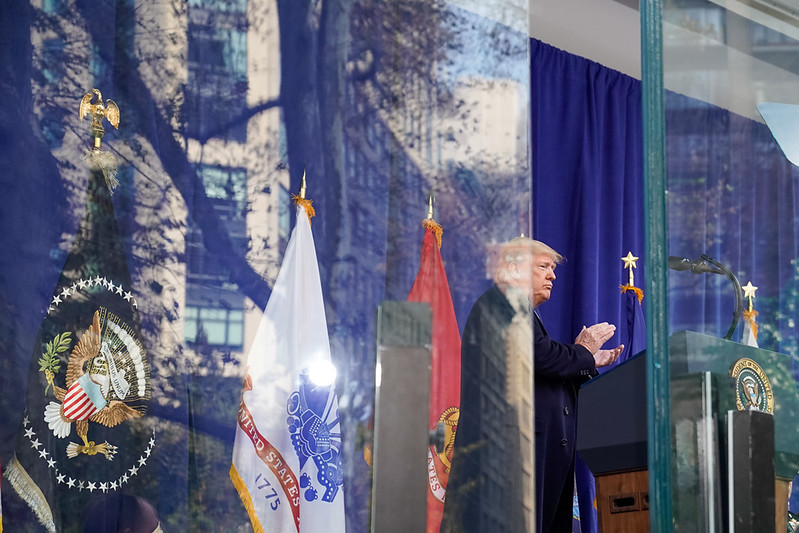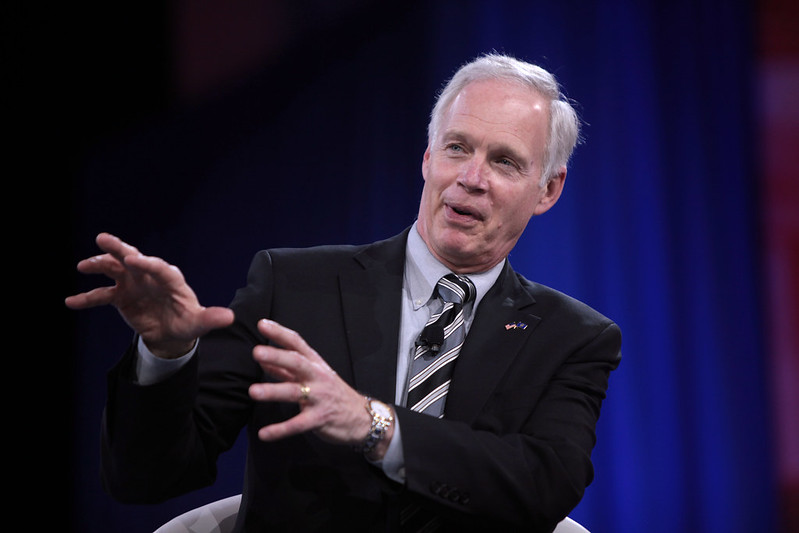Gordon Sondland Accuses the President of Bribery
A key exchange between the ambassador and Rep. Adam Schiff gives the whole ballgame away.

Published by The Lawfare Institute
in Cooperation With

Article II, Section 4 of the Constitution makes the president subject to impeachment and removal for “Treason, Bribery, or other high Crimes and Misdemeanors.”
Normally, we debate impeachment in terms of the last phrase—the mysterious catch-all, “high Crimes and Misdemeanors.” But today, Amb. Gordon Sondland, testifying before the House in the ongoing impeachment inquiry, offered a crystal clear account of how President Trump engaged in bribery.
The meaning of the term “bribery” in the impeachment clauses is not coextensive with the meaning of the same word in the criminal code. The impeachment clause predates the federal criminal code, and its contours are decided more by the common law of impeachment than by the terms of specific criminal laws. So I’m not invoking 18 U.S.C. § 201 to evaluate whether Trump committed a crime.
That said, the bribery statute offers a reasonable working definition of what it means to bribe a public official: “Whoever ... directly or indirectly, corruptly gives, offers or promises anything of value to any public official ... to influence any official act” has committed the offense.
What’s more, the statute also offers a reasonable working definition of what it means for a public official to demand a bribe: “Whoever ... being a public official … directly or indirectly, corruptly demands, seeks, receives, accepts, or agrees to receive or accept anything of value personally ... in return for ... being influenced in the performance of any official act” also has committed the offense.
Now consider the following exchange that took place today between Sondland and Intelligence Committee Chairman Adam Schiff, which I reproduce here at some length. You can see, in its text, Schiff probing Sondland as to the elements of the bribery offense—which is quite evidently on Schiff’s mind as he asks these questions:
Schiff: Let me get to the top line here, Ambassador Sondland.
Sondland: Okay.
Schiff: You've testified that the White House meeting that President Zelensky desperately wanted [was] very important to President Zelensky, was it not?
Sondland: Absolutely.
Schiff: You testified that that meeting was conditioned, was a quid pro quo, for what the president wanted, these two investigations. Is that right?
Sondland: Correct.
Schiff: And that everybody knew it.
Sondland: Correct.
Schiff: Now that White House meeting was going to be an official meeting between the two presidents, correct?
Sondland: Presumably.
Schiff: It would be an Oval Office meeting, hopefully?
Sondland: A working meeting, yes.
Schiff: A working meeting. So an official act.
Sondland: Yes.
Schiff: And in order to perform that official act, Donald Trump wanted these two investigations that would help his re-election campaign, correct?
Sondland: I can't characterize why he wanted them. All I can tell you is this is what we heard from Mr. Giuliani.
Schiff: But he had to get those two investigations if that official act was going to take place, correct?
Sondland: He had to announce the investigations. He didn't actually have to do them, as I understood it.
Schiff: Okay, President Zelensky had to announce the two investigations the president wanted, make a public announcement, correct?
Sondland: Correct.
Schiff: And those were of great value to the president; he was quite insistent upon them and his attorney was insistent upon them?
Sondland: I don't want to characterize whether they were valued, not valued. Again, through Mr. Giuliani, we were led to believe that that's what he wanted.
Schiff: Well, and you said Mr. Giuliani was acting at the president's demand, correct?
Sondland: Right, when the president says talk to my personal lawyer, Mr. Giuliani, we followed his direction.
Schiff: And so that official act of that meeting was being conditioned on the performance of these things the president wanted as expressed both directly and through his lawyer, Rudy Giuliani. Correct?
Sondland: As expressed through Rudy Giuliani. Correct.
Schiff: And you've also testified is that your understanding, it became your clear understanding that the military assistance was also being withheld pending Zelensky announcing these investigations. Correct?
Sondland: That was my presumption, my personal presumption based on the facts at the time. Nothing was moving.
Schiff: And in fact, you had a discussion, communication with the secretary of state in which you said that [the] logjam over aid could be lifted if Zelensky announced these investigations, right?
Sondland: I did not, I don't recall saying the logjam over aid. I recall saying the logjam.
Schiff: That's what you meant, right, ambassador?
Sondland: I meant that whatever was holding up the meeting whatever was holding up our deal with Ukraine, I was trying to break. Again, I was presuming.
Schiff: Well, here's what you said in your testimony a moment ago, page 18: "But my goal at the time was to do what was necessary to get the aid released, to break the logjam." Okay, that's still your testimony, right?
Sondland: Yes.
Schiff: So the military aid is also an official act, am I right?
Sondland: Yes
Schiff: This was not President Trump’s personal bank account he’s writing a check from. This is $400 million of U.S. taxpayer money, is it not?
Sondland: Absolutely.
Schiff: There was a logjam in which the president would not write that U.S. check, you believed, until Ukraine announced these two investigations the president wanted.
Sondland: That was my belief.
Remember the words of the statute: Whoever, being a public official, directly or indirectly, corruptly demands anything of value personally in return for being influenced in the performance of any official act has engaged in the crime of bribery.
This exchange seems to me unambiguously to describe a corrupt demand for something personally valuable (investigations of political opponents) in return for being influenced in the performance of two official acts (granting a White House meeting and releasing hundreds of millions of dollars in military assistance).
In the questioning that followed, Republican counsel Steve Castor and Republican members sought to emphasize how little Sondland actually knew—suggesting that he, like witnesses last week, was not describing anything Trump had actually done, just his own impressions of a situation. But Sondland is unlike the witnesses last week. He had multiple, direct interactions on this subject with the president himself.
The first was on May 23, when Sondland and other officials went to brief Trump on Zelensky’s election and their excitement about having a reformist Ukrainian president with whom to work. They asked Trump to have a call with Zelensky and a White House meeting. “Unfortunately, President Trump was skeptical,” Sondland testified. “He expressed concerns that the Ukrainian government was not serious about reform. He even mentioned that Ukraine tried to take him down in the last election.” Sondland reported that “In response to our persistent efforts to change his views, President Trump directed us to ‘talk with Rudy’” Giuliani.
What did Giuliani, to whom Trump had personally directed Sondland, say to him? “Mr. Giuliani emphasized that the President wanted a public statement from President Zelensky committing Ukraine to look into corruption issues. Mr. Giuliani specifically mentioned the 2016 election (including the DNC server) and Burisma as two topics of importance to the President.”
In other words, behind the exchange with Schiff is a specific claim that Trump personally directed Sondland to Giuliani, who then made substantive demands on Trump’s behalf for the investigations he wanted.
But it doesn’t end there. Sondland also confirms, while quibbling over details, that he spoke by phone with Trump on July 26 from a restaurant in Kiev and that the president, as another witness recounts, asked him whether Zelensky was going to deliver the investigations. “Actually,” Sondland testified, “I would have been more surprised if President Trump had not mentioned investigations, particularly given what we were hearing from Mr. Giuliani about the President’s concerns.”
And then there’s, of course, the text of the Trump-Zelensky call itself, in which Trump asked for Zelensky to initiate the very investigations described in these other incidents, shortly after Zelensky asked for his continued military assistance.
Was Trump here acting “corruptly”? Duh. Seeking investigations of political foes for personal political gain is a prototypically corrupt. But beyond that, Sondland was clear in his testimony that Trump wasn’t actually asking for the investigations themselves, but merely the announcement of them. In other words, he wanted not an investigation of corruption, but the political optics of Ukraine’s declaring that his political opponents were under investigation. What’s more, Sondland also confirmed that Trump seemed not to care a whit about Ukraine—that he only cared about the investigations that could benefit him.
In short, a witness with first-hand knowledge of both U.S. interactions with the Ukrainians and the president’s own conduct today accused President Trump of soliciting a bribe from a foreign head of state. Whether or not this would qualify as a bribe under the criminal law, I would have no hesitation describing it as one if I were a member of Congress considering the impeachment of a president.



-final.png?sfvrsn=b70826ae_3)

